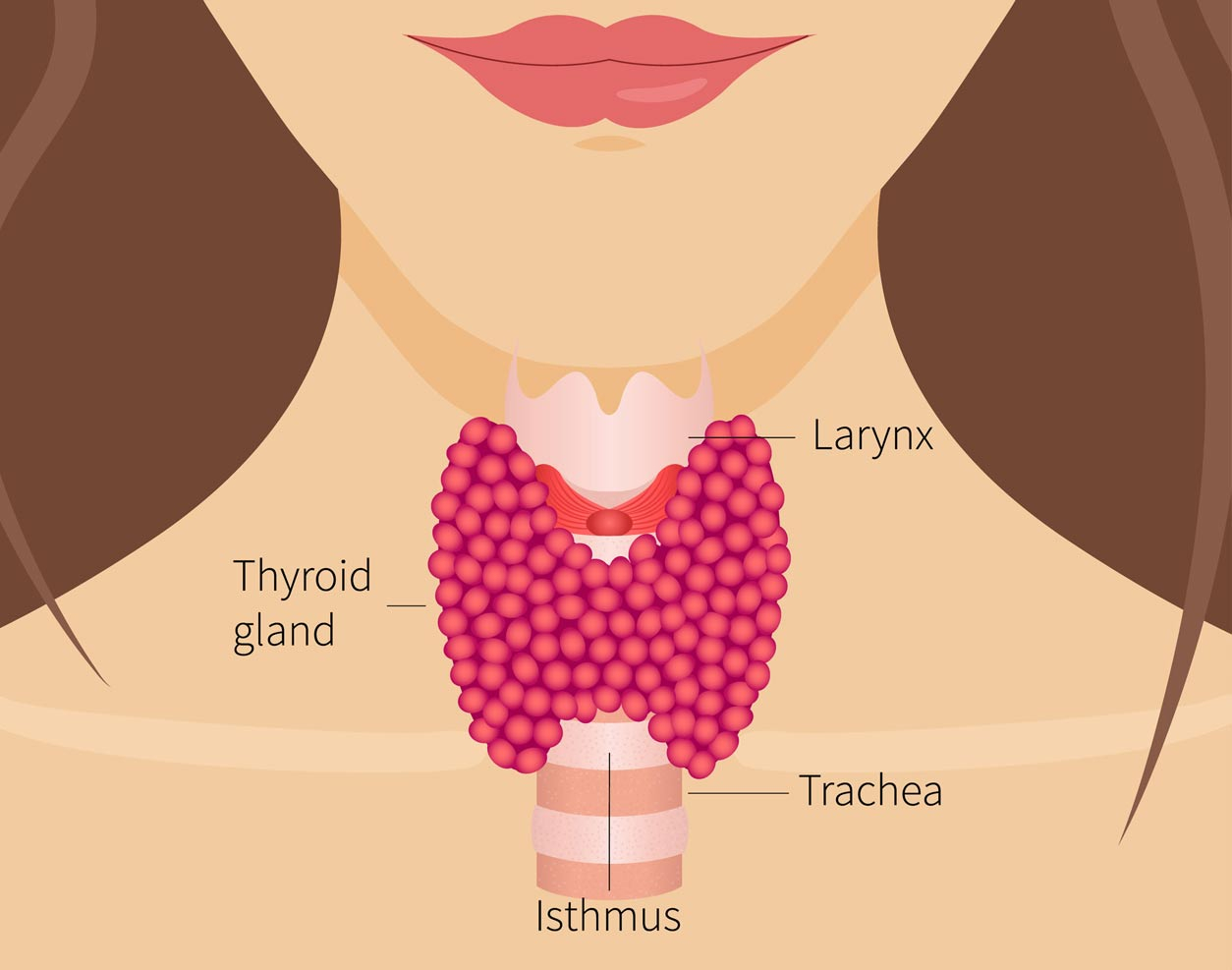At the front of your neck is a butterfly-shaped gland that produces two primary hormones. This gland is known as the thyroid, and it can become overactive by producing more thyroid hormone than your body needs. When this happens, it is called hyperthyroidism.
The condition can accelerate your body’s metabolism, causing unintentional weight loss as well as a rapid or irregular heartbeat. It can also drastically alter your body temperature, leading to constant discomfort during your daily life.
Around 1 in 100 Americans aged 12 and above have hyperthyroidism, although it is more common in women and people over 60. For this reason, we thought it would be worthwhile shedding some light on the condition, and how you can treat it.
What are the symptoms of hyperthyroidism?
As mentioned above, an overactive thyroid can cause a range of symptoms. Some are simply unpleasant, while others may require medical treatment. They include:
- Irregular or unusually fast heart rate
- Persistent tiredness and fatigue
- Anxiety and irritability
- Twitching or trembling
- Heat sensitivity
- Neck swelling
- Insomnia
All of these symptoms could be signs, so if you believe you have an overactive thyroid you should speak to your doctor right away. They will arrange a blood test to confirm whether or not that is the case. This test will check for levels of:
- Thyroid-stimulating hormone (TSH) – A hormone produced by the pituitary gland (a gland at the base of the brain) which controls the production of thyroid hormones
- Triiodothyronine (T3) – One of the main thyroid hormones
- Thyroxine (T4) – Another of the main thyroid hormones
Your thyroid hormone levels will be compared to what is considered normal for a healthy person of your age. A low level of TSH and high levels of T3 and/or T4 usually means you have an overactive thyroid.

What causes hyperthyroidism?
There is no single way for any individual to develop hyperthyroidism. In fact, there are a number of conditions that can cause your thyroid to become overactive. They include:
Graves’ disease – This is an autoimmune condition where your immune system mistakenly attacks your thyroid, causing it to become overactive. About 3 in 4 people with an overactive thyroid have this condition, and it mostly affects young or middle-aged women.
Thyroid nodules – Nodules are non-cancerous lumps that develop on your thyroid. They can contain thyroid tissue, which results in the production of excess thyroid hormones. It is not known why these nodules develop, but they usually occur in people over 60.
Pituitary adenoma – A non-cancerous tumor in the pituitary gland that causes an increase in the level of hormones produced by your thyroid.
Thyroid cancer – This is rare, however, a cancerous thyroid tumor can affect the production of thyroid hormones.
Overexposure to iodine – Certain medicines, like amiodarone, contain iodine. This increase in iodine can cause your thyroid to produce excess hormones, although the condition should ease once you lower your iodine intake.
High levels of chorionic gonadotropin – This occurs in early pregnancy, multiple pregnancy or a molar pregnancy. The latter refers to when a lump of abnormal cells grows in the womb instead of a healthy fetus.
Again, your doctor is best placed to trace the route of your hyperthyroidism. Through testing, they will be able to tell you which of the above conditions (if any) you have.
Can it be treated?

In most cases, an overactive thyroid can be treated. You will be referred to an endocrinologist who will plan your treatment. There are three categories: medicine, radioactive iodine treatment and surgery.
Medicine – Thionamides are usually prescribed by your doctor to stop your thyroid from producing excess hormones. You will usually need to take these for 1–2 months before you notice any significant benefits. To help relieve other symptoms in the meantime, you may also be given another medicine called a beta blocker.
Radioactive iodine treatment – This is a form of radiotherapy used to destroy the cells in the thyroid gland, reducing the amount of hormones it can produce. It is highly effective and can indeed cure an overactive thyroid, although it could take a few weeks or months for the full benefits to be felt.
Surgery – Removing the thyroid gland is typically the last option, although it may be necessary if it is severely swollen, or you have serious eye problems caused by the overactive thyroid. With this method of treatment, you will be required to take specific medication for the rest of your life.
What medication is available to treat an overactive thyroid?
Antithyroid medicine, specifically methimazole and propylthiouracil. The latter is for women during the first 12 weeks of pregnancy, as the former could harm the fetus. Not only can these medicines reduce the severity of your condition, they can also treat symptoms of Graves’ disease.
Like any other medication, antithyroid medicine could cause side effects including:
- Allergic reactions such as rashes and itching
- A decrease in the number of white blood cells in your body
- Liver failure (in rare cases)
You should contact your doctor right away if you have any of the following symptoms:
- Fatigue or weakness
- Dull pain in your abdomen
- Loss of appetite
- Easy bruising
- Yellowing of your skin or whites of your eyes is called Jaundice
- Fever, chills or a constant sore throat
Where Medix comes in
If you have been diagnosed with an overactive thyroid, pharmaceutical costs are probably the last thing you want to think about. However, when it comes to your treatment, we want you to have peace of mind that a Medix mail-order pharmacy offers an affordable alternative to bricks-and-mortar drugstores.
Provided you have a valid prescription from your doctor, you can purchase beta-blockers or other necessary medication from our website now. For more information, please call 1-866-500-6633 (toll-free phone number) or +44 1438 500111 (international phone number).
Alternatively, you can submit your details through our contact form and we will get back to you.
The content on this website is intended for information purposes only. It does not constitute medical advice.





